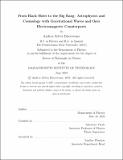From Black Holes to the Big Bang: Astrophysics and Cosmology with Gravitational Waves and their Electromagnetic Counterparts
Author(s)
Biscoveanu, Andrea Sylvia
DownloadThesis PDF (24.98Mb)
Advisor
Vitale, Salvatore
Terms of use
Metadata
Show full item recordAbstract
The growing catalog of gravitational-wave signals from compact object mergers has allowed us to study the properties of black holes and neutron stars more precisely than ever before and has opened a new window through which to probe the earliest moments in our universe’s history. Population-level measurements of the masses and spins of compact objects can reveal how these systems form and evolve. Multi- messenger observations of compact object mergers can shed light on the properties of the electromagnetic counterparts of these systems, such as short gamma-ray bursts and kilonovae. Finally, observations of the stochastic gravitational-wave background can constrain early-universe physics inaccessible with other means.
In this thesis, I demonstrate how we can leverage such observations of gravitational waves and their electromagnetic counterparts to learn about astrophysics and cosmology. The first part focuses on methods for facilitating the detection of electromagnetic counterparts and the simultaneous analysis of gravitational-wave and electromagnetic data for mergers including a neutron star. I then transition to a detailed study of black hole spin, including characterizing the measurability of spin in individual systems with current gravitational-wave detectors and presenting novel population-level analyses. This work is complemented by the development of new methods for increasingly detailed gravitational-wave data analysis. Such analyses will be critical to the astrophysical interpretation of the growing catalog of compact-object binaries and will enable the future detection of the cosmological stochastic gravitational-wave background.
Date issued
2023-06Department
Massachusetts Institute of Technology. Department of PhysicsPublisher
Massachusetts Institute of Technology